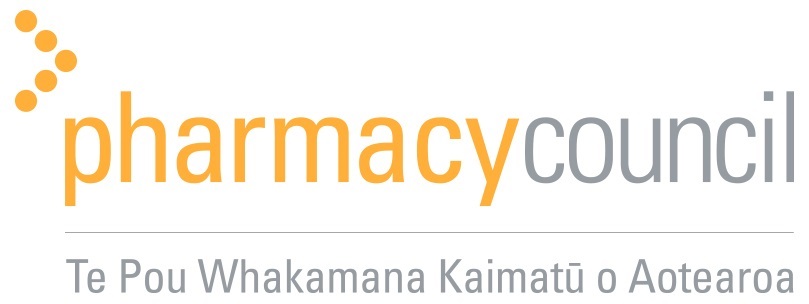
Our office will be closed from 2.00pm Friday 20 December and will reopen on Monday 6 January 2025. We wish you all a safe and happy festive season.
FROM THE COUNCIL CHAIR AND CE
THANK YOU TO THE PROFESSION
Welcome to our last newsletter of 2024. As we approach the finish line, in what has been another busy and ever-changing year for the pharmacy sector, we thank pharmacists for all you do to support the health of our communities. The care and reassurance you provide are the cornerstones of the public’s high trust in the profession. We also acknowledge your adherence to the profession’s Competence Standards and Code of Ethics to maintain the professionalism pharmacists are renowned for.
We are immensely grateful to all the pharmacists who have contributed to our work this year, assisting us to deliver high-quality regulation to safeguard public health and wellbeing. This collective approach strengthens our ability to refine our regulatory tools to be responsive to health sector changes. We encourage you to consider and apply for opportunities as they arise to contribute to areas of our work across areas such as recertification, notifications and compliance, scopes of practice, and accreditation.
In this newsletter we cover a range of topics, including:
- Learning opportunities from cases investigated by the Health and Disability Commissioner and the Health Practitioners Disciplinary Tribunal
- The high pass rate for November’s Assessment Centre exams, which provide reassurance that pharmacists are able to practise independently
- Key recommendations from Council’s MyRecert review of portfolios
- Accreditation of the new University of Waikato graduate entry pharmacy course
- An introduction to our new registrar who has a wealth of legal and regulatory experience.
We continue to focus on raising awareness of our role and the breadth of regulatory tools we use under the HPCA Act to uphold public safety and to support pharmacists’ safe practice.
We have taken on board the need to improve how we communicate and always welcome your feedback to make sure we are keeping you well informed of our activities to support professional self-regulation. We trust that you found our communications series ahead of the APC fee and disciplinary levy consultation insightful.
On behalf of the Council and our office team, we wish you all a safe and enjoyable break. We hope you enjoy some quality time with your loved ones over the festive season.
We look forward to reconnecting with you in 2025.
Ngā mihi
Arthur Bauld (Chair) and Michael Pead (CE)
IMPORTANT FOR YOU TO KNOW
HIGH ASSESSMENT CENTRE PASS RATE WELCOME BOOST FOR PHARMACIST WORKFORCE
The high pass rate in the November Assessment Centre (AC) for intern pharmacists will be a welcome boost for New Zealand’s pharmacist workforce. 
Council and the Pharmaceutical Society of New Zealand put out a joint media release to announce the results and to congratulate interns on their achievement.
The November AC pass rate is almost 80 percent, which is an excellent result. This means that the interns who passed the AC are now eligible to apply and register in the pharmacist scope of practice.
“Registering in the scope means they will be able to work independently as safe and competent pharmacists, using their skills to contribute to better health outcomes in our communities,” said Council Chief Executive Michael Pead.
The AC is truly a team effort and Council thanked the Society for its support of interns as well as helping to run the AC.
“Council is also very appreciative of the pharmacists who contributed to the AC, writing, reviewing and piloting cases, or as assessors,” said Michael.
REVIEW OF 2023/24 MYRECERT PORTFOLIOS COMPLETED
Council recently reviewed a random selection of MyRecert portfolios for the 2023/24 practising year. As expected, the majority (83%) of portfolios reviewed were to an acceptable level.
We have written an article to provide a summary of what we found, our review process, and key areas where improvements could be made. Read our article here
INSIGHTS TO SUPPORT SAFE PRACTICE - HDC DECISION
Paediatrics Redipred dosage unit error
The HDC published its decision on a case (23HDC01508), which found that the pharmacist did not adequately assess a prescription for clinical appropriateness as part of the dispensing process. A key message in this article is the need to invest time in quality improvement. Case details are published for educational purposes.
Case description
A four-week-old baby was diagnosed with croup and prescribed Redipred 5mg/ml liquid, with the instruction to ‘give 4.5mg po daily’ over two days. Unfortunately, the trainee technician misread the prescription, processed and labelled the prescription as ‘Give 4.5mls with food ONCE daily in the morning for a TWO-day course as directed.’ The checking pharmacist did not pick up the dosage error (4.5mls is equivalent to five times the prescribed dose) and failed to provide counselling to the baby’s caregiver. The dosage error led to the baby needing to be resuscitated and hospitalised.
Consistent process to perform prescription clinical appropriateness checks
The pharmacist did not follow her usual process to ‘circle the patient’s age, the dose, and for paediatric prescriptions, to note the patient’s weight’ and if concerned to look up the New Zealand Formulary to check the clinical appropriateness of the prescription. The HDC was also critical of the pharmacist for not counselling or having a discussion with the patient’s caregiver (a lost opportunity where the dosage error may have been picked up).
Pharmacies should:
- Embed processes to ensure that the clinical appropriateness of prescribed medicine is carried out.
- Deliver regular dispensary staff training/refreshers (including for locums) on standard operating procedures, such as the Dispensing Process.
- Eliminate or reduce distractions/interruptions when carrying out clinical tasks such as dispensing and checking processes.
- Identify and carry out an organisational quality improvement initiative. For example, the HDC recommended the pharmacy perform a random self-audit as a remedial action. This self-audit involved 50 prescriptions over a one-month period to assess the pharmacy’s compliance with the processing, dispensing, clinical appropriateness and checking of prescriptions.
Investment in quality improvement and patient safety essential
Pharmacists are obligated to continuously monitor and improve the quality of their own practice. They also have an obligation to monitor and improve the organisational systems, processes, and culture in which they practise and that are within their sphere of control. Improving the systems, processes, and culture in which a pharmacist works, can help to ensure that high quality care is regularly provided and can also mitigate risks, errors and/or harm.
Pharmacists should foster and ‘create a culture where quality and safety are everybody’s primary goal.’ This can include:
- Person-centred care
- An open and transparent culture
- Active participation of all dispensary staff (and partnering to enhance clinical governance), and
- A continuous quality improvement focus.
Relevant Council Standards can be read in Competence Standards for Aotearoa New Zealand Pharmacy Profession and the Code of Ethics
Assess prescriptions, including (Competency 6.1.3) applies knowledge in undertaking a clinical assessment of the prescription to ensure pharmaceutical and therapeutic appropriateness of the treatment and to determine whether any changes in prescribed medicines are warranted.
Competency 2.5: Contributes to quality improvement and knowledge advancement through application of continuous quality improvement and maintaining a safe, just and continuous quality improvement culture.
Code of Ethics 3H Contributes to public safety by participating in pharmacovigilance (for example, reporting of adverse events) and risk management activities.
Code of Ethics 5H Raises concerns and takes appropriate steps if policies, systems, working conditions or the actions of others may compromise patient care or public safety.
HEALTH PRACTITIONERS DISCIPLINARY TRIBUNAL (HPDT) FINDINGS
The HPDT holds disciplinary proceedings against health practitioners, including pharmacists, alleged to have breached standards of practice. HPDT case decisions involving pharmacists are provided to Council as a learning opportunity for the profession to promote safe, competent practice.
The HPDT published two cases in November 2024:
1) Charges were established against pharmacist Ms Nee Nee Ong, which warranted disciplinary sanction, and included: failing to ensure prescription medicines were supplied in accordance with legal and professional obligations (for example, allowing the pharmacy to operate without a pharmacist being present, failing to securely store and monitor controlled medicines and failing to implement an adequate reporting system for dispensing errors. Ms Ong was also found to have practised in an unsafe manner by dispensing prescriptions early and failing to perform the requisite clinical consultations.
The HPDT said that the offending was aggravated by the pharmacist’s lack of engagement in the disciplinary process and lack of insight into the offending. Read our summary here.
2) Twenty charges were established against pharmacist Mr Shane Chafin, which amounted to professional misconduct. Charges included making public statements which questioned the accuracy of Covid-19 information provided by the Government and health officials which had the potential to risk the health and wellbeing of individuals. He was also found to have failed in his professional responsibility by disclosing confidential information and ignoring requests from the Pharmacy Council. Read our summary here.
OUR ENGAGEMENT JOURNEY
NEW ZEALAND HOSPITAL PHARMACY ASSOCIATION (NZHPA) CONFERENCE
Council’s presentation at the NZHPA conference last month in Ōtepoti, Dunedin focused on the distinct differences and interdependence of cultural competence, cultural safety and hauora Māori. CE Michael Pead and Senior Advisor, Māori and Health Equity Natalia Taurima-Hinton discussed the definitions and nuances of these three pou (pillars), how they overlap, and their alignment to Council’s Competence Standards for Aotearoa New Zealand Pharmacists domain one Applies te Tiriti o Waitangi and domain two Professionalism in Pharmacy.
Natalia shared her personal experiences of culturally unsafe practice. She also explained aspects of power and privilege, and the importance of debunking the misconception that cultural competence and cultural safety are the same.
Council appreciated the audience’s interest and engagement, with one attendee describing the session as thought-provoking and enlightening.
APC FEE AND DISCIPLINARY LEVY CONSULTATION
The Council would like to thank the pharmacists and professional associations who engaged in the APC fee and disciplinary levy consultation. The consultation document on the proposed increases to the APC fee and disciplinary levy was sent to all registrants and stakeholders on 31 October and submissions closed on 9 December.
The decision on the APC fee and disciplinary levy for 2025/26, and the rationale for this decision, will be communicated to the profession in January 2025. We will also continue to publish all consultation material on our website, including submissions and our response to these.
Council members appreciate the time and effort taken to provide your feedback, questions and ideas. They would like to assure the profession that they carefully consider each submission, which helps to inform their thinking.
PROFESSIONAL CONDUCT COMMITTEE MEMBERS – APPLICATIONS OPEN
Council welcomes expressions of interest from pharmacists and lay people wishing to be appointed as Professional Conduct Committee (PCC) members. 
PCCs are appointed by the Council to independently investigate complaints about registered pharmacists. Committees are made up of two pharmacists and one layperson.
Candidates will ideally have experience with committee work, an open and questioning mindset, the ability to assess information objectively and a commitment to ensuring an effective and fair investigation.
For more information, including how to apply for this role, visit our vacancies page here. Applications close 31 January 2025.
KEEPING YOU UP TO DATE
MEET OUR NEW REGISTRAR
Nyenyezi Siameja joined Council as Registrar last month with a wealth of experience in legal and regulatory roles in both New Zealand and the UK.
Nyenyezi graduated from the University of Waikato with a conjoint Bachelor of Laws and Bachelor of Science.
Her early career experience included working within the Waitangi Tribunal registry, and as a solicitor and consultant for Tuia Group, predominantly focussed on Māori sector engagement and post settlement governance systems. Nyenyezi later returned to the Waitangi Tribunal and was appointed the Tribunal’s Registrar.
Nyenyezi moved to the UK to do a master’s degree in Violence, Conflict and Development at the School of Oriental and African Studies, University of London. In the UK she worked at the Professional Standards Authority for Health and Social Care which oversees 10 UK health and care regulators. When she worked at the Authority a particularly memorable time was being involved in the Morecambe Bay midwifery review, which was initiated at the request of the Secretary of State for Health.

In her last professional role in the UK, Nyenyezi worked at the Nursing and Midwifery Council, the independent regulator of more than 826,000 nurses, midwives and nursing associates within the UK. This was a very busy role, which focussed on assessing all initial fitness to practise referrals received by the Council.
Nyenyezi returned to New Zealand in September of this year and was keen to take up the opportunity of working for Council as our Registrar. She hopes to bring the experience from her varied roles in professional regulation to support the work of Council and continue to ensure high quality decisions on competence and fitness to practise.
When not working, Nyenyezi has a full-on home life with her husband and two young children under the age of five. When she does have the rare opportunity to have some time out, she enjoys introducing her ‘little Londoners’ to the joys of the great New Zealand outdoors.
NEW GRADUATE-ENTRY MASTER OF PHARMACY PRACTICE DEGREE
A new graduate-entry Master of Pharmacy Practice degree will be offered by the University of Waikato from February 2025. Council was very pleased to confirm its accreditation of this two-year postgraduate degree, following a rigorous and thorough process.
Enrolments opened last month for 30 training places, which will increase to 50 students in the second year and beyond. The degree provides an alternative pathway to becoming a pharmacist for students with an existing Bachelor’s qualification in the sciences.
“Accreditation is one of Council’s proactive tools to protect the public and provides assurance about the quality of pharmacy education providers and their programmes,” says CE Michael Pead. “This in turn ensures that pharmacists practise safely and competently when they register and enter into a scope of practice.”
In Council’s accreditation report, we commended the school’s commitment to te ao Māori and cultural safety to cover both clinical and cultural competence standards.
Council wishes to thank our Programme Accreditation Team and our Accreditation Advisory Group, as well as the University of Waikato representatives involved in the accreditation process.
Accreditation is now undertaken in-house by Council, whereas previously it was contracted to an external accreditation provider based in Australia. Council developed an accreditation system to be more specific and relevant to Aotearoa New Zealand settings, which included giving greater effect to honouring Te Tiriti o Waitangi to reduce health inequities.
On 15 June 2023 Council published the new Aotearoa New Zealand Accreditation Standards for Pharmacy Programmes, which came into effect from April this year. This means all programmes (new and existing) are now accredited against these new standards.

